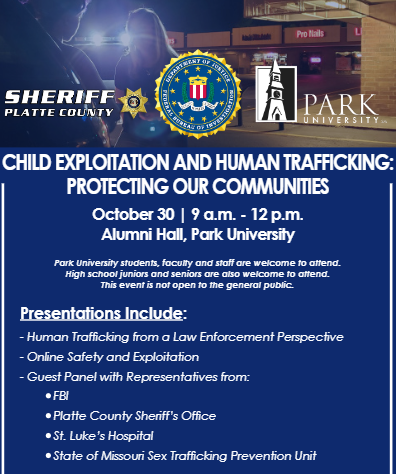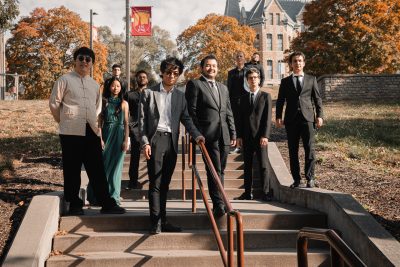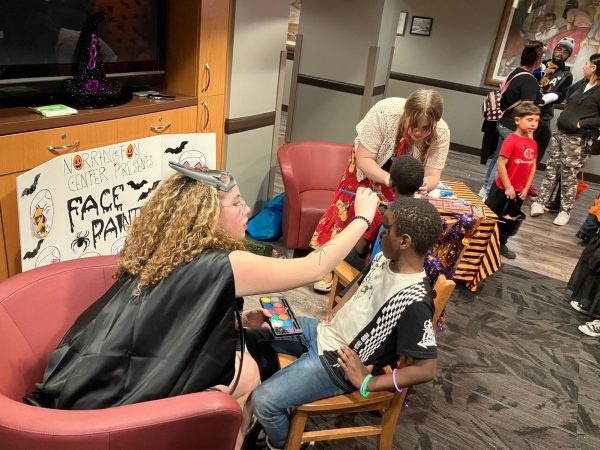Park hosts Kansas City Peacebuilding Conference
On Friday, Nov. 3, Park University hosted the second of the three-day Greater Kansas City Peacebuilding Conference. The focus was on educating and circulating ideas about peacebuilding, as well as breaking down misconceptions about it, hence the conference’s title, “Peacebuilding and Nonviolence: Beyond the Clichés.” So what is peacebuilding?
Steven Youngblood, director of the Center for Global Peace Journalism at Park, anticipates this question and it is the first he answers, starting with what peacebuilding is not.
“Peacebuilding is not peacekeeping. It is not the blue helmeted UN troops. Nor is it peace-making, so it’s not two people signing a treaty and shaking hands. Nor is it humanitarian support, like money given to various international causes to help stabilize things after an emergency,” said Youngblood.
To be clear, Youngblood does not disparage any of these functions or their importance. However, none of them are the topic of the day.
“Instead, think of peacebuilding as a concept of something that’s longer term. Peacebuilding seeks to plant the seeds for a sustainable peace,” said Youngblood.
The discussion of those seeds at the conference encompassed new looks at political processes designed to promote peace and perspectives on the media’s role in peacebuilding.
The first of these was discussed at length by Johnson County Community College student, Taylor Smith. He first defined liberal democracy, such as the one we have today. This form of democracy emphasizes consensus. He noted the shortcoming of liberal democracy, in which a “tyranny of the majority” can disrupt peace by leaving minorities with no civil means of voicing their views. One alternative to this form is an agonistic democracy. Marie Paxton, professor of political science at JCCC, expounded upon this difference, starting with an example of liberal democracy’s shortcomings.
“There’s this more subtle notion of agreeing to disagree. When we look at our previous election, when you know someone voted a different way than you, rather than having that conversation about ‘Why did you vote that way?’ we’re just going to try to not talk to that person and avoid that conflict all together,” Paxton said. She declines this approach as being an unrealistic way to attain lasting peace. Instead, she promotes agonistic democracy and its exploration of using conflict to make society more inclusive.
“Conflict will always be there, so with this approach we’re trying to actually bring that passion and emotion back into the conversations that we’re having,” she said.
Her hope is that by showing these strong convictions and points of view, people will understand each other’s positions better, rather than making assumptions based on the causes they support.
After discussing ideas for the population to be more open to conflict as a path to peace, the conference moved on to discuss government and the media’s role in this process.
Olga Paschenko is a graduate of Park University, with a degree in communication and leadership. She worked as a translator for the Associated Press in Eastern Ukraine, where she witnessed firsthand the extreme possibilities and problems propaganda and framing can present, as well as ways to overcome it. Through many examples and definitions, she drew the distinction between the two thusly: While framing is the natural result of viewing any subject and deciding what is important, propaganda is any attempt to warp this view to fit a government’s, group’s or other propagandist’s agenda.
“Propaganda is the absolute negative aspect of framing,” she said. Similar to the discussion of types of democracy, Paschenko’s redress for propaganda is open communication rather than evasion.
As the evening wound to a close, Youngblood retook the stage to provide a summation. Instead, however, he offered a series of questions. Among them: How can we talk to those with whom we disagree or with whom we have conflict and are passion and peace compatible? He also challenged the audience to consider how our discourse can include or empower marginalized communities, women and indigenous people, among others.
“More questions than answers, I would propose to you, means it’s been a very good afternoon,” said Youngblood.
Your donation will support the student journalists of Park University. Your contribution will allow us to cover our annual website hosting costs, freeing up other funds for equipment, printing and training.





